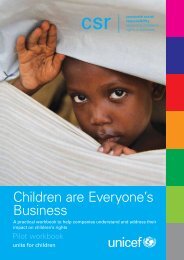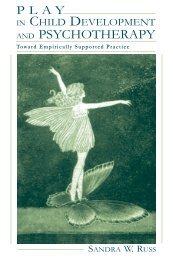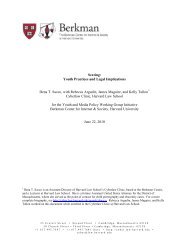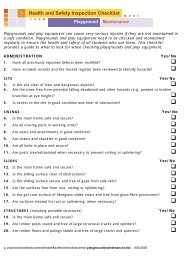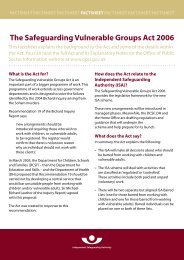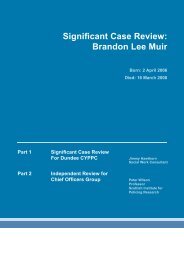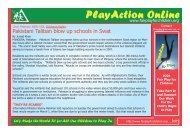Vetting and disclosures - Fair Play For Children
Vetting and disclosures - Fair Play For Children
Vetting and disclosures - Fair Play For Children
You also want an ePaper? Increase the reach of your titles
YUMPU automatically turns print PDFs into web optimized ePapers that Google loves.
• Provision of legal advice to a child.<br />
• Temporary or occasional work, such as building work, in a specified place such as a school or<br />
children’s home.<br />
• Supervised volunteer work in specified setting such as schools or children’s homes.<br />
• The work of people in governance or senior management roles, or officials in the <strong>Children</strong> <strong>and</strong><br />
Family Court’s Advisory Service or inspectorates.<br />
The changes mean that people on the barred list will be able to work in these positions.<br />
Thresholds for regulated activity<br />
6. Regulated activity refers to the positions which are covered by vetting <strong>and</strong> barring arrangements.<br />
If an individual has been barred, they will still be able to work with children in positions that do<br />
not count as regulated activity, <strong>and</strong> their employers 1 will not be told if they are barred – even if<br />
they conduct an enhanced Criminal Records Bureau (CRB) check (which they would not have to<br />
do). Therefore it is very important that the regulated activity category covers all those positions<br />
where individuals have regular close contact <strong>and</strong> can develop trusting relationships with children.<br />
7. The witnesses who gave evidence to our enquiry all raised<br />
concerns about the fact that many people under “regular day to<br />
day supervision” in their work with children will not fall within<br />
the category of regulated activity in the changed vetting <strong>and</strong><br />
barring scheme, <strong>and</strong> therefore will not have to be CRB checked.<br />
We were given the example of a junior football coach, who<br />
might take a group of children away to a pitch far away from the<br />
head coach, <strong>and</strong> yet would still be seen as under supervision <strong>and</strong><br />
so would not be checked.<br />
8. The Minister reassured us that positions such as the football<br />
coach, where an individual takes groups of children away from<br />
the main supervising adult, would count as regulated activity,<br />
<strong>and</strong> that this would be set out clearly in guidance for employers.<br />
This is reassuring: it is very important that employers are told<br />
that supervised positions will only be exempt from regulated<br />
activity if individuals are under close supervision. The Protection<br />
of Freedoms Bill, as currently written, is not clear on this point.<br />
“… a large proportion of activity in our<br />
sector is undertaken by those who are<br />
technically being supervised by<br />
another, but, in real terms the<br />
supervision has little control over<br />
what happens… <strong>and</strong> adults therefore<br />
still have a significant opportunity to<br />
gain trust <strong>and</strong> influence over<br />
children.”<br />
“…abuse won’t happen in the middle<br />
of a sports pitch, but the relationship<br />
is established there whether they are<br />
supervised or unsupervised. All<br />
coaches hold a powerful positive over<br />
a child.”<br />
Quotes from responses to our survey.<br />
Recommendation 1: Government should bring forward an amendment to the Protection of<br />
Freedoms Bill during report stage to tighten up the definition of supervision for the purposes<br />
of the vetting <strong>and</strong> barring scheme.<br />
Recommendation 2: Government guidance <strong>and</strong> communications about the vetting <strong>and</strong><br />
barring scheme must be very clear about activity that is included in the scheme, <strong>and</strong> what<br />
supervision is required for positions outside the scheme.<br />
Single Disclosures<br />
9. The Protection of Freedoms Bill changes the way in which CRB <strong>disclosures</strong> will be shared.<br />
Currently, when an individual gets a CRB disclosure, their certificate is simultaneously sent to<br />
them <strong>and</strong> to their employer. In the future CRB <strong>disclosures</strong> will only be sent to the individual<br />
involved <strong>and</strong> employers will have to obtain it from them.<br />
1 Throughout this report, the term ‘employers’ is used to cover any organisation that may employ paid staff, consultants or volunteers to<br />
work with children.<br />
3




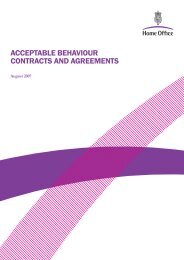
![The Childcare Act 2006 - Notes [Website] - Fair Play For Children](https://img.yumpu.com/50144819/1/184x260/the-childcare-act-2006-notes-website-fair-play-for-children.jpg?quality=85)

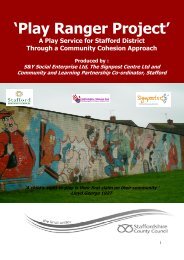


![Bouncy Castles [PDF] - Fair Play For Children](https://img.yumpu.com/45463572/1/184x260/bouncy-castles-pdf-fair-play-for-children.jpg?quality=85)
